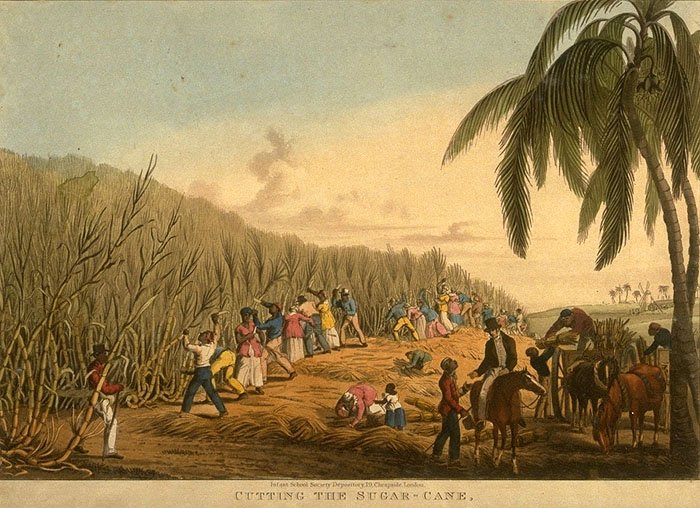After eleven seasons, the premiere of The Walking Dead’s final season hit TV screens on 15th August. In 2014, the series, inspired by Robert Kirkman’s comic books, smashed US cable TV records and since debuting in 2010 it has spawned a bumper franchise. The Walking Dead encapsulates our current zombie mania. More zombie movies have been made in the past two decades than the previous seven combined while the undead permeate popular culture, costumes and vocabulary. The word ‘zombie’ is used in banking, cocktails and insults. ‘Ghosting’ in online dating walks hand in hand with ‘zombieing’.
However the monster’s origins as a staple of cinematic terror is fraught. The zombie was born in the studios of Hollywood but it was conceived in colonial caricatures of Vodou and one of the Americas most brutal slave systems.
Vodou is a highly syncretic religious practice, founded on West Africa and Caribbean traditions arriving in 16th century Haiti, then Saint-Domingue, under French colonial rule. Plantations in Saint-Domingue produced 40 percent of sugar and 60 percent of coffee imported to Europe and slaves brought across the Atlantic from West Africa formed the industry’s backbone.
One concept which emerged in Vodou in Saint-Domingue was the zombi. Academics speculate the word derives from West African languages – ndzumbi means ‘corpse’ in the Mitsogo language of Gabon, and nzambi means the ‘spirit of a dead person’ in Congolese. The emergence of the zombi in Haitian Vodou was the logical outcome of a slave system where an estimated 1m people were trapped in a cycle of unending labour and astronomical death rates.
Toiling on plantations, thousands chose suicide over living hell. The zombi spectre, however, dissuaded many from suicide. To die from unnatural causes carried the risk of being resurrected as a zombi by a witch doctor to be their slave. To be a zombi without agency or name, a field hand suspended between spiritual life and death, was worse than killing yourself.
After Haiti’s bloody slave revolt and revolutionary war dislodged French colonists in 1804, the newly independent country was ostracised by the West as a threat to imperialism. The political elite, determined to maintain ties outlawed Vodou until 2003, fearful that it would damage Haiti’s image. Vodou, known for its spirituality, colourful ceremonies and hypnotic experiences, was demonised.
In that, the British role is understated. “When British travel writers, diplomats and personnel went to Haiti in the 18th century, that was the first time negative writing started to emerge about Vodou,” said Professor Matthew Smith of University College London. The most notorious work to emerge was Sir Spencer St. John’s Hayti or The Black Republic. Published in 1884, the memoir included allegations of Vodou worshippers practicing cannibalism.
When America occupied Haiti in 1915, many views of the country were informed by such literature, generating even more stereotypes of Vodou. One book, The Magic Island, had considerable impact when author William Seabrook, visiting the island in 1927, happened upon ‘zombies’, brutalised slaves living in squalor working fields for American manufacturers. His sensationalised account, published in 1929, became fact.
With the horror genre taking off in America, his idea of “a soulless human corpse taken from the grave and endowed by sorcery,” excited Broadway and Hollywood directors. For American audiences, battered by the Great Depression, horror films like Frankenstein and Dracula offered escapism. White Zombie, directed and released by Victor Halperin in 1932, the first zombie movie, channelled underlying fears of Vodou and blackness in America. At a time when the lynching of black people was still common and white supremacism rampant, White Zombie reflected a nation’s identity crisis.
Over nine decades, political commentary has evolved delving into a range of human fears from nuclear extinction to the spread of contagions. Yet recently, societal ills which inspired the zombie genre may have come full-circle amplified by debates on race, immigration and terrorism which have gone global with the zombie.
The Walking Dead is a bleaker take on a world fractured by culture wars, rampant disinformation and political tribalism in the face of unprecedented crises like climate change. Survivors on The Walking Dead can be as dangerous as the undead stalking a land of dwindling resources, warlords and cults. In a world of moral ambiguity, inhumanity amongst the living asks us who the real harbingers of death are in crises.
The zombie’s creation in the man-made apocalypse of Saint-Domingue, where slaves saw their masters as monsters and slavers tarred black people as ghouls, poses similar difficult questions as the West re-examines its colonial graveyards.
Sources:
[1] Walking Dead breaks US cable TV record, BBC https://www.bbc.co.uk/news/entertainment-arts-29611037
[2] How the zombie represents America’s deepest fears, Vox, https://www.vox.com/policy-and-politics/2016/10/31/13440402/zombie-political-history
[3] What is zombieing and how to handle it, https://www.burnerapp.com/blog/what-is-zombieing-ghosting
[4] Haiti (Saint-Domingue), Slavery and Remembrance, http://slaveryandremembrance.org/articles/article/?id=A0111
[5] Interview, Professor Matthew Smith, 29th July, 2021
[6] Haiti (Saint-Domingue), Slavery and Remembrance, http://slaveryandremembrance.org/articles/article/?id=A0111
[7] Where do zombies come from?, BBC, https://www.bbc.com/culture/article/20150828-where-do-zombies-come-from
[8] Haitian Marronnage: Voyages and Resistance, https://sites.duke.edu/marronnagevoyages/slavery-and-marronnage-in-saint-domingue/
[9] Elizabeth Abbott, Haiti, A Shattered Nation, p.27
[10] The Tragic, Forgotten History of Zombies, The Atlantic, https://www.theatlantic.com/entertainment/archive/2015/10/how-america-erased-the-tragic-history-of-the-zombie/412264/
[11] Zoinks! Tracing The History Of 'Zombie' From Haiti To The CDC, NPR, https://www.npr.org/sections/codeswitch/2013/12/13/250844800/zoinks-tracing-the-history-of-zombie-from-haiti-to-the-cdc
[12] Interview, Professor Matthew Smith, 29th July, 2021
[13] Interview, Professor Matthew Smith, 29th July, 2021
[14] Zombies, Cannibals and Werewolves: https://www.historytoday.com/archive/history-matters/zombies-cannibals-and-werewolves or Hayti or the Black Republic, https://www.dloc.com/UF00076088/00001/2j
[15] William Seabrook, The Magic Island, 95-97
[16] William Seabrook, The Magic Island, 94.
[17] How the zombie represents America’s deepest fears, Vox, https://www.vox.com/policy-and-politics/2016/10/31/13440402/zombie-political-history
[18] Sarah Churchwell, Behold America, A History of America First and the American Dream, 187-188.
[19] How the zombie represents America’s deepest fears, Vox, https://www.vox.com/policy-and-politics/2016/10/31/13440402/zombie-political-history
